Block Chain Technology Analysis and Applications Case Study
VerifiedAdded on 2020/05/28
|18
|4125
|494
Report
AI Summary
This report presents a comprehensive case study on block chain technology, evaluating its potential applications, advantages, disadvantages, and associated risks, with a specific focus on the context of Sunshine Finance Company. The study explores the technology's real-world implementations across diverse sectors, including banking, retail, agriculture, and healthcare, and also analyzes block chain-based applications such as digital identity, database, and smart contracts. The report identifies key challenges, such as security and trust issues, and provides recommendations for mitigating these risks, including the application of cybersecurity systems, risk management strategies, and technology upgrades. The analysis is based on a review of relevant literature and aims to provide insights for the organization's potential expansion strategies, particularly the adoption of block chain technology to address current business problems, and provides recommendations for senior management's consideration. The report aims to resolve the current problems by considering block chain technologies and applications along with the advantages, disadvantages and risks associated with it.
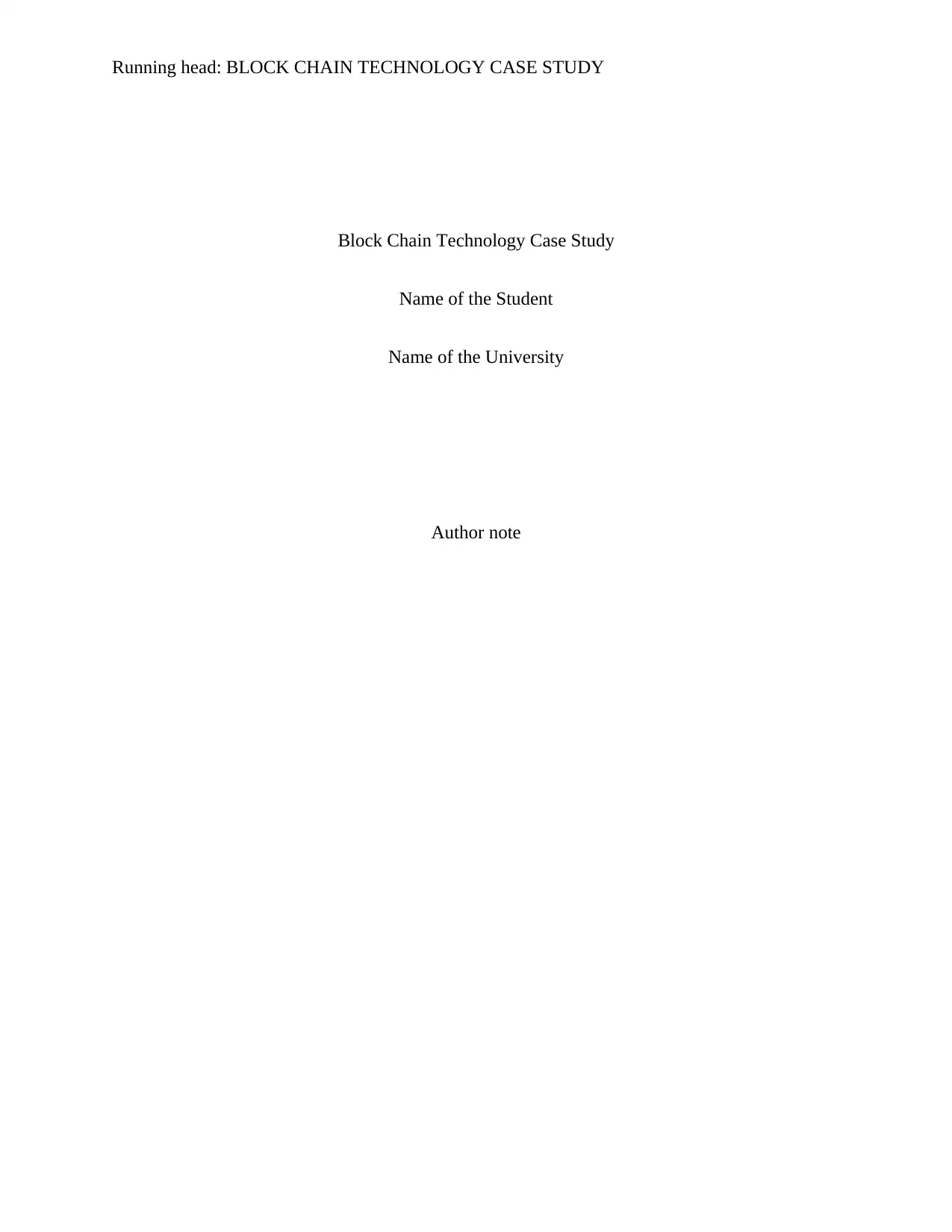
Running head: BLOCK CHAIN TECHNOLOGY CASE STUDY
Block Chain Technology Case Study
Name of the Student
Name of the University
Author note
Block Chain Technology Case Study
Name of the Student
Name of the University
Author note
Paraphrase This Document
Need a fresh take? Get an instant paraphrase of this document with our AI Paraphraser
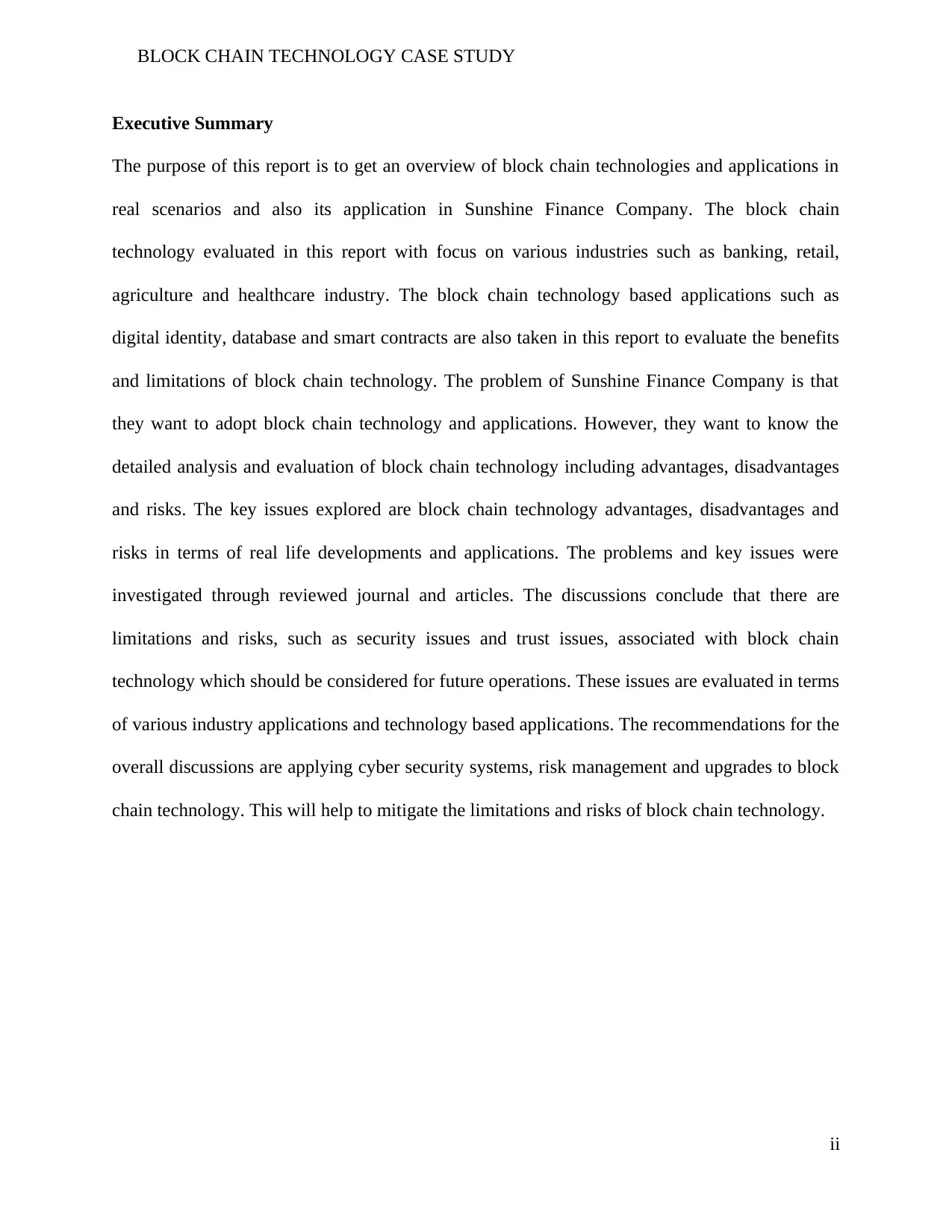
BLOCK CHAIN TECHNOLOGY CASE STUDY
Executive Summary
The purpose of this report is to get an overview of block chain technologies and applications in
real scenarios and also its application in Sunshine Finance Company. The block chain
technology evaluated in this report with focus on various industries such as banking, retail,
agriculture and healthcare industry. The block chain technology based applications such as
digital identity, database and smart contracts are also taken in this report to evaluate the benefits
and limitations of block chain technology. The problem of Sunshine Finance Company is that
they want to adopt block chain technology and applications. However, they want to know the
detailed analysis and evaluation of block chain technology including advantages, disadvantages
and risks. The key issues explored are block chain technology advantages, disadvantages and
risks in terms of real life developments and applications. The problems and key issues were
investigated through reviewed journal and articles. The discussions conclude that there are
limitations and risks, such as security issues and trust issues, associated with block chain
technology which should be considered for future operations. These issues are evaluated in terms
of various industry applications and technology based applications. The recommendations for the
overall discussions are applying cyber security systems, risk management and upgrades to block
chain technology. This will help to mitigate the limitations and risks of block chain technology.
ii
Executive Summary
The purpose of this report is to get an overview of block chain technologies and applications in
real scenarios and also its application in Sunshine Finance Company. The block chain
technology evaluated in this report with focus on various industries such as banking, retail,
agriculture and healthcare industry. The block chain technology based applications such as
digital identity, database and smart contracts are also taken in this report to evaluate the benefits
and limitations of block chain technology. The problem of Sunshine Finance Company is that
they want to adopt block chain technology and applications. However, they want to know the
detailed analysis and evaluation of block chain technology including advantages, disadvantages
and risks. The key issues explored are block chain technology advantages, disadvantages and
risks in terms of real life developments and applications. The problems and key issues were
investigated through reviewed journal and articles. The discussions conclude that there are
limitations and risks, such as security issues and trust issues, associated with block chain
technology which should be considered for future operations. These issues are evaluated in terms
of various industry applications and technology based applications. The recommendations for the
overall discussions are applying cyber security systems, risk management and upgrades to block
chain technology. This will help to mitigate the limitations and risks of block chain technology.
ii
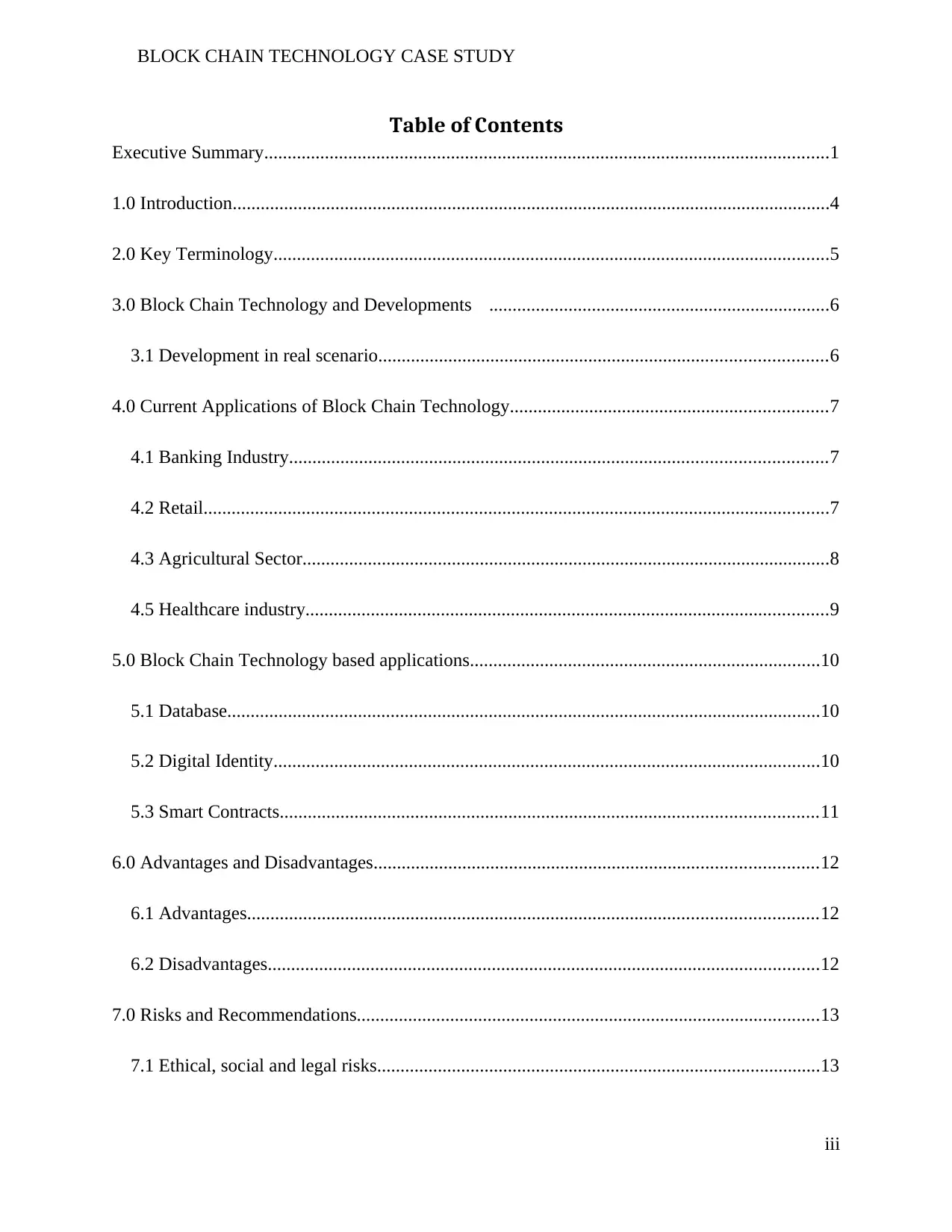
BLOCK CHAIN TECHNOLOGY CASE STUDY
Table of Contents
Executive Summary.........................................................................................................................1
1.0 Introduction................................................................................................................................4
2.0 Key Terminology.......................................................................................................................5
3.0 Block Chain Technology and Developments .........................................................................6
3.1 Development in real scenario................................................................................................6
4.0 Current Applications of Block Chain Technology....................................................................7
4.1 Banking Industry...................................................................................................................7
4.2 Retail......................................................................................................................................7
4.3 Agricultural Sector.................................................................................................................8
4.5 Healthcare industry................................................................................................................9
5.0 Block Chain Technology based applications...........................................................................10
5.1 Database...............................................................................................................................10
5.2 Digital Identity.....................................................................................................................10
5.3 Smart Contracts...................................................................................................................11
6.0 Advantages and Disadvantages...............................................................................................12
6.1 Advantages..........................................................................................................................12
6.2 Disadvantages......................................................................................................................12
7.0 Risks and Recommendations...................................................................................................13
7.1 Ethical, social and legal risks...............................................................................................13
iii
Table of Contents
Executive Summary.........................................................................................................................1
1.0 Introduction................................................................................................................................4
2.0 Key Terminology.......................................................................................................................5
3.0 Block Chain Technology and Developments .........................................................................6
3.1 Development in real scenario................................................................................................6
4.0 Current Applications of Block Chain Technology....................................................................7
4.1 Banking Industry...................................................................................................................7
4.2 Retail......................................................................................................................................7
4.3 Agricultural Sector.................................................................................................................8
4.5 Healthcare industry................................................................................................................9
5.0 Block Chain Technology based applications...........................................................................10
5.1 Database...............................................................................................................................10
5.2 Digital Identity.....................................................................................................................10
5.3 Smart Contracts...................................................................................................................11
6.0 Advantages and Disadvantages...............................................................................................12
6.1 Advantages..........................................................................................................................12
6.2 Disadvantages......................................................................................................................12
7.0 Risks and Recommendations...................................................................................................13
7.1 Ethical, social and legal risks...............................................................................................13
iii
⊘ This is a preview!⊘
Do you want full access?
Subscribe today to unlock all pages.

Trusted by 1+ million students worldwide
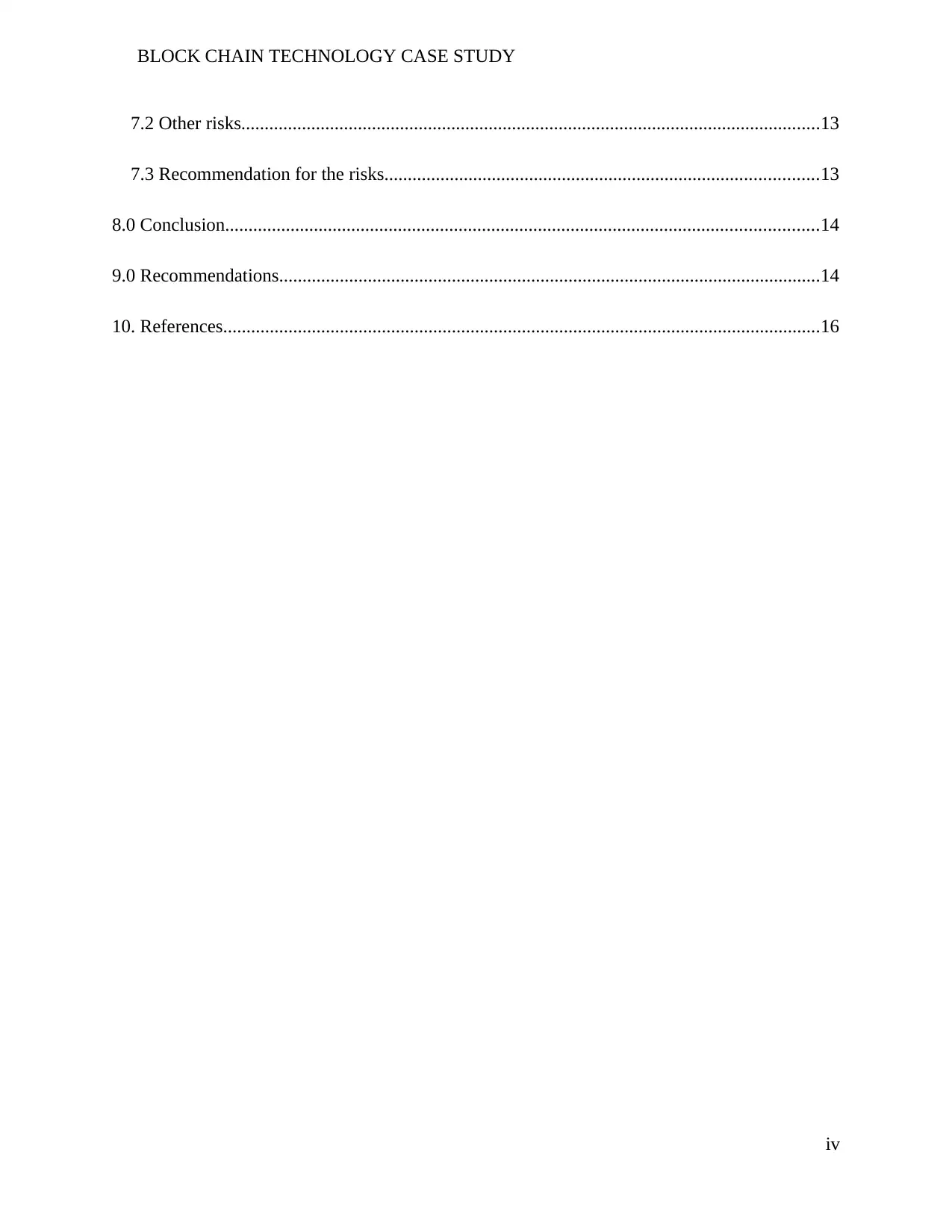
BLOCK CHAIN TECHNOLOGY CASE STUDY
7.2 Other risks............................................................................................................................13
7.3 Recommendation for the risks.............................................................................................13
8.0 Conclusion...............................................................................................................................14
9.0 Recommendations....................................................................................................................14
10. References................................................................................................................................16
iv
7.2 Other risks............................................................................................................................13
7.3 Recommendation for the risks.............................................................................................13
8.0 Conclusion...............................................................................................................................14
9.0 Recommendations....................................................................................................................14
10. References................................................................................................................................16
iv
Paraphrase This Document
Need a fresh take? Get an instant paraphrase of this document with our AI Paraphraser
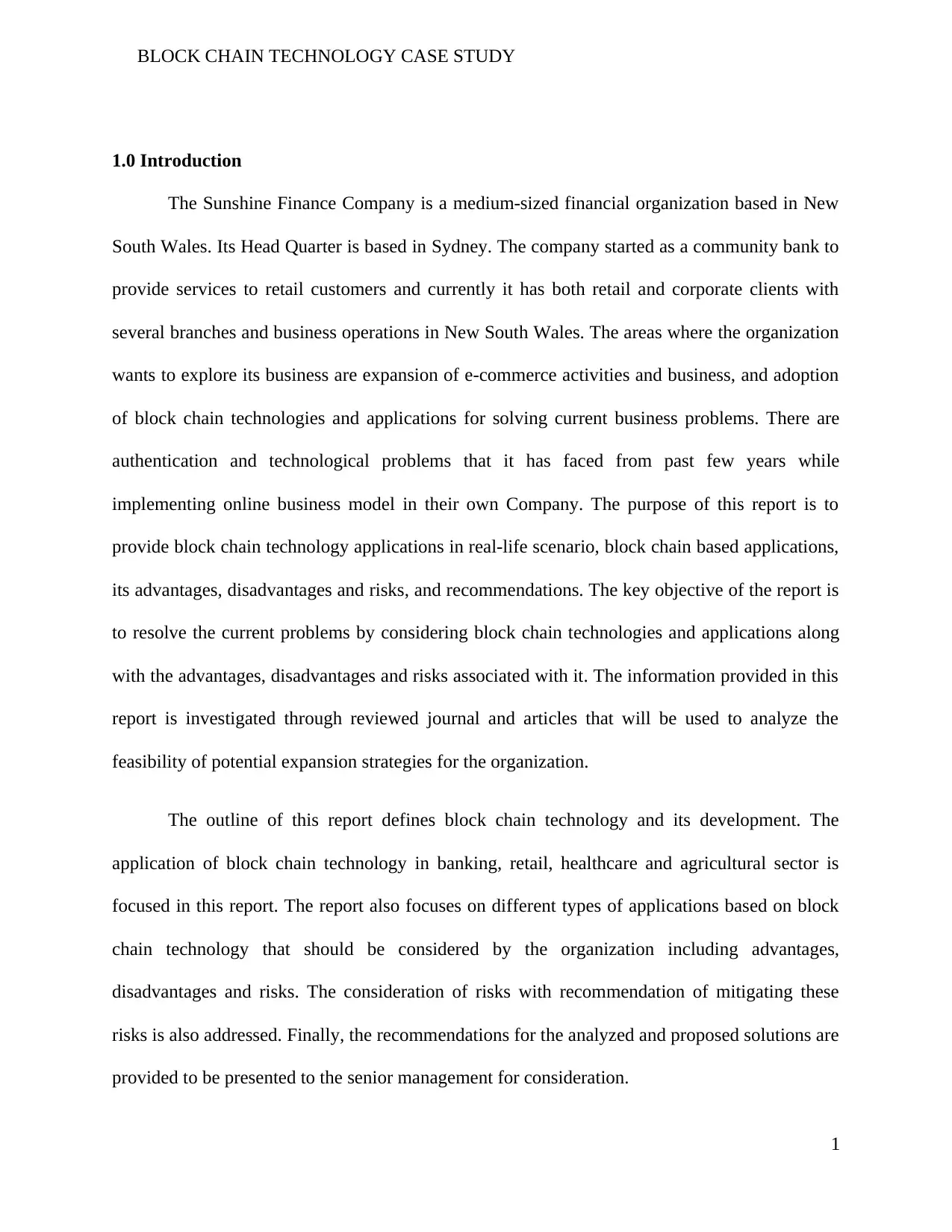
BLOCK CHAIN TECHNOLOGY CASE STUDY
1.0 Introduction
The Sunshine Finance Company is a medium-sized financial organization based in New
South Wales. Its Head Quarter is based in Sydney. The company started as a community bank to
provide services to retail customers and currently it has both retail and corporate clients with
several branches and business operations in New South Wales. The areas where the organization
wants to explore its business are expansion of e-commerce activities and business, and adoption
of block chain technologies and applications for solving current business problems. There are
authentication and technological problems that it has faced from past few years while
implementing online business model in their own Company. The purpose of this report is to
provide block chain technology applications in real-life scenario, block chain based applications,
its advantages, disadvantages and risks, and recommendations. The key objective of the report is
to resolve the current problems by considering block chain technologies and applications along
with the advantages, disadvantages and risks associated with it. The information provided in this
report is investigated through reviewed journal and articles that will be used to analyze the
feasibility of potential expansion strategies for the organization.
The outline of this report defines block chain technology and its development. The
application of block chain technology in banking, retail, healthcare and agricultural sector is
focused in this report. The report also focuses on different types of applications based on block
chain technology that should be considered by the organization including advantages,
disadvantages and risks. The consideration of risks with recommendation of mitigating these
risks is also addressed. Finally, the recommendations for the analyzed and proposed solutions are
provided to be presented to the senior management for consideration.
1
1.0 Introduction
The Sunshine Finance Company is a medium-sized financial organization based in New
South Wales. Its Head Quarter is based in Sydney. The company started as a community bank to
provide services to retail customers and currently it has both retail and corporate clients with
several branches and business operations in New South Wales. The areas where the organization
wants to explore its business are expansion of e-commerce activities and business, and adoption
of block chain technologies and applications for solving current business problems. There are
authentication and technological problems that it has faced from past few years while
implementing online business model in their own Company. The purpose of this report is to
provide block chain technology applications in real-life scenario, block chain based applications,
its advantages, disadvantages and risks, and recommendations. The key objective of the report is
to resolve the current problems by considering block chain technologies and applications along
with the advantages, disadvantages and risks associated with it. The information provided in this
report is investigated through reviewed journal and articles that will be used to analyze the
feasibility of potential expansion strategies for the organization.
The outline of this report defines block chain technology and its development. The
application of block chain technology in banking, retail, healthcare and agricultural sector is
focused in this report. The report also focuses on different types of applications based on block
chain technology that should be considered by the organization including advantages,
disadvantages and risks. The consideration of risks with recommendation of mitigating these
risks is also addressed. Finally, the recommendations for the analyzed and proposed solutions are
provided to be presented to the senior management for consideration.
1
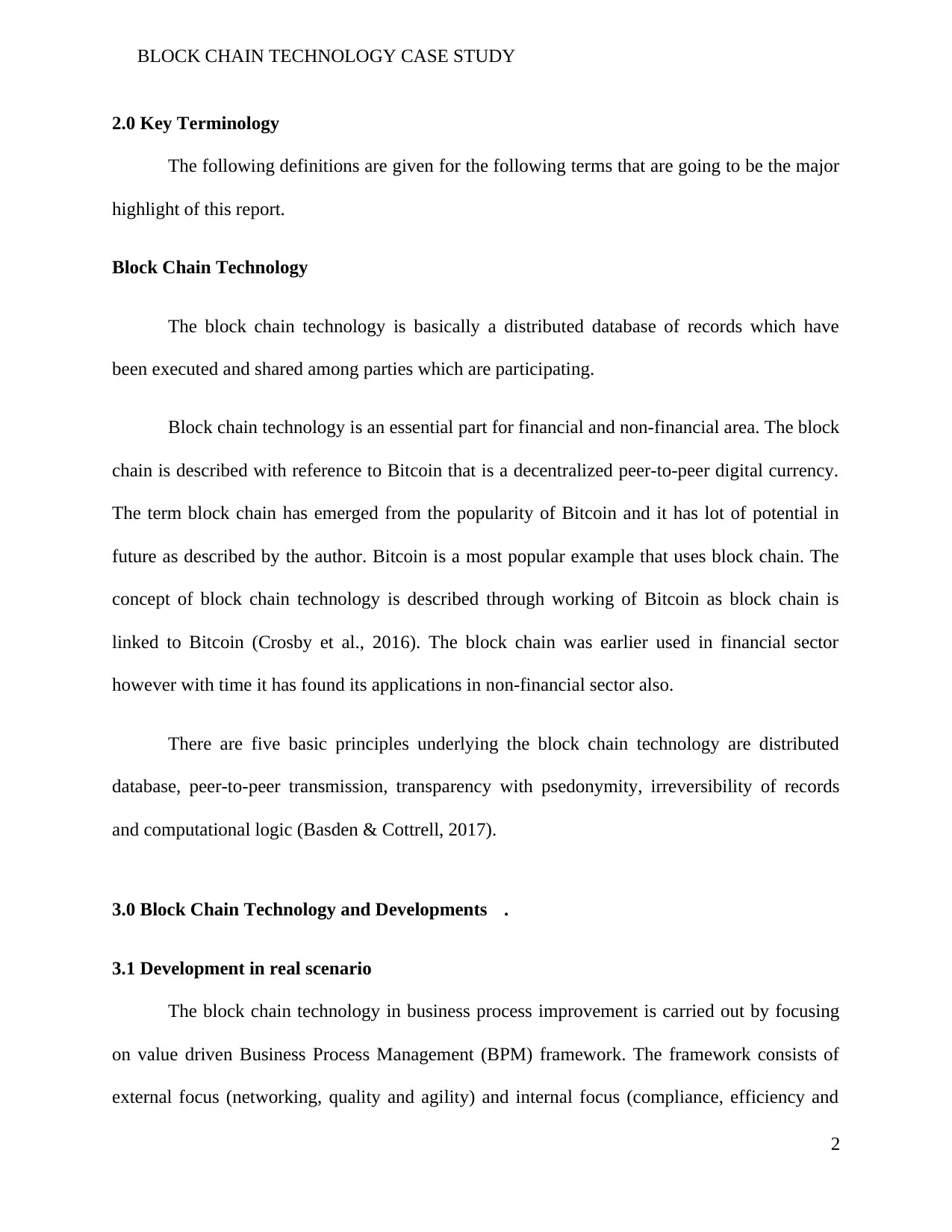
BLOCK CHAIN TECHNOLOGY CASE STUDY
2.0 Key Terminology
The following definitions are given for the following terms that are going to be the major
highlight of this report.
Block Chain Technology
The block chain technology is basically a distributed database of records which have
been executed and shared among parties which are participating.
Block chain technology is an essential part for financial and non-financial area. The block
chain is described with reference to Bitcoin that is a decentralized peer-to-peer digital currency.
The term block chain has emerged from the popularity of Bitcoin and it has lot of potential in
future as described by the author. Bitcoin is a most popular example that uses block chain. The
concept of block chain technology is described through working of Bitcoin as block chain is
linked to Bitcoin (Crosby et al., 2016). The block chain was earlier used in financial sector
however with time it has found its applications in non-financial sector also.
There are five basic principles underlying the block chain technology are distributed
database, peer-to-peer transmission, transparency with psedonymity, irreversibility of records
and computational logic (Basden & Cottrell, 2017).
3.0 Block Chain Technology and Developments .
3.1 Development in real scenario
The block chain technology in business process improvement is carried out by focusing
on value driven Business Process Management (BPM) framework. The framework consists of
external focus (networking, quality and agility) and internal focus (compliance, efficiency and
2
2.0 Key Terminology
The following definitions are given for the following terms that are going to be the major
highlight of this report.
Block Chain Technology
The block chain technology is basically a distributed database of records which have
been executed and shared among parties which are participating.
Block chain technology is an essential part for financial and non-financial area. The block
chain is described with reference to Bitcoin that is a decentralized peer-to-peer digital currency.
The term block chain has emerged from the popularity of Bitcoin and it has lot of potential in
future as described by the author. Bitcoin is a most popular example that uses block chain. The
concept of block chain technology is described through working of Bitcoin as block chain is
linked to Bitcoin (Crosby et al., 2016). The block chain was earlier used in financial sector
however with time it has found its applications in non-financial sector also.
There are five basic principles underlying the block chain technology are distributed
database, peer-to-peer transmission, transparency with psedonymity, irreversibility of records
and computational logic (Basden & Cottrell, 2017).
3.0 Block Chain Technology and Developments .
3.1 Development in real scenario
The block chain technology in business process improvement is carried out by focusing
on value driven Business Process Management (BPM) framework. The framework consists of
external focus (networking, quality and agility) and internal focus (compliance, efficiency and
2
⊘ This is a preview!⊘
Do you want full access?
Subscribe today to unlock all pages.

Trusted by 1+ million students worldwide
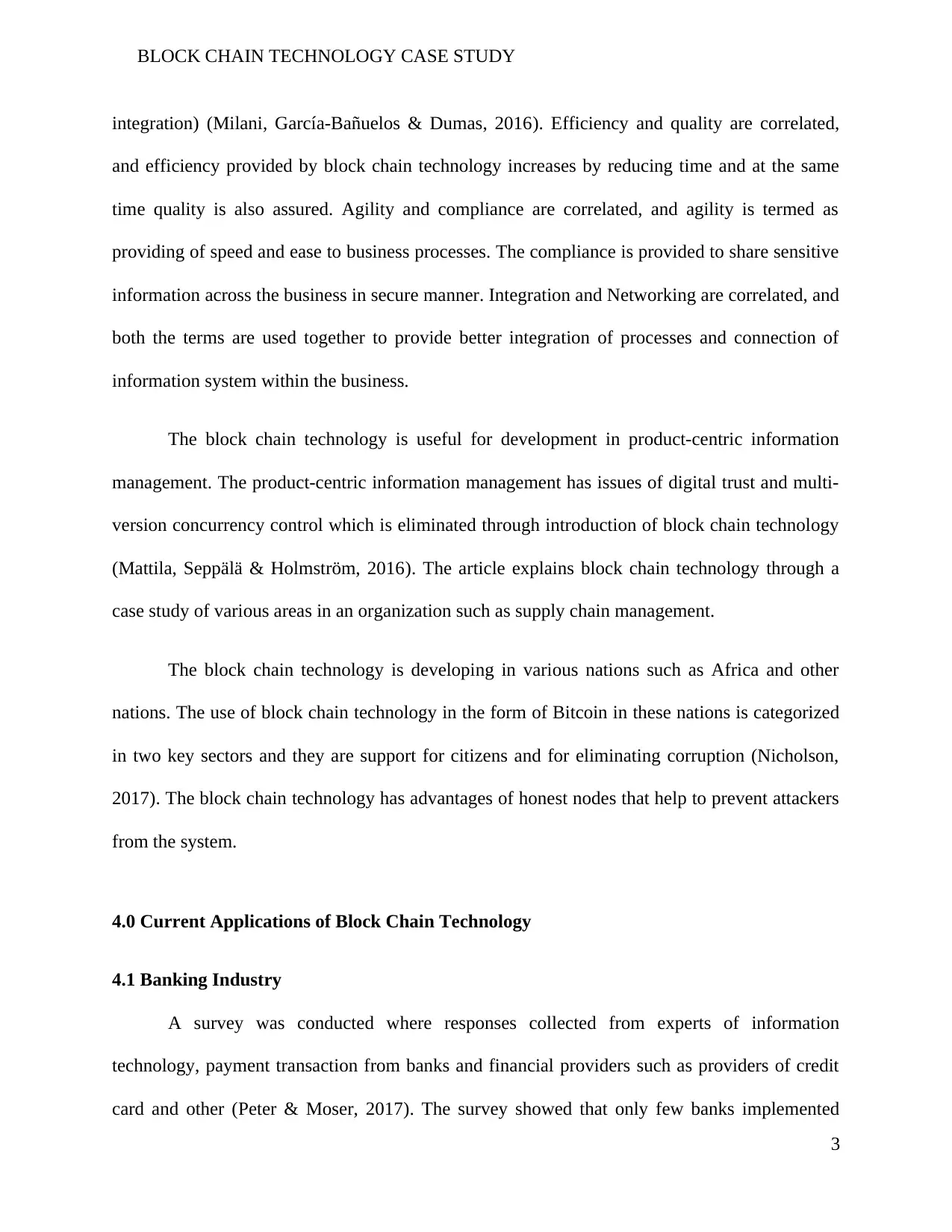
BLOCK CHAIN TECHNOLOGY CASE STUDY
integration) (Milani, García-Bañuelos & Dumas, 2016). Efficiency and quality are correlated,
and efficiency provided by block chain technology increases by reducing time and at the same
time quality is also assured. Agility and compliance are correlated, and agility is termed as
providing of speed and ease to business processes. The compliance is provided to share sensitive
information across the business in secure manner. Integration and Networking are correlated, and
both the terms are used together to provide better integration of processes and connection of
information system within the business.
The block chain technology is useful for development in product-centric information
management. The product-centric information management has issues of digital trust and multi-
version concurrency control which is eliminated through introduction of block chain technology
(Mattila, Seppälä & Holmström, 2016). The article explains block chain technology through a
case study of various areas in an organization such as supply chain management.
The block chain technology is developing in various nations such as Africa and other
nations. The use of block chain technology in the form of Bitcoin in these nations is categorized
in two key sectors and they are support for citizens and for eliminating corruption (Nicholson,
2017). The block chain technology has advantages of honest nodes that help to prevent attackers
from the system.
4.0 Current Applications of Block Chain Technology
4.1 Banking Industry
A survey was conducted where responses collected from experts of information
technology, payment transaction from banks and financial providers such as providers of credit
card and other (Peter & Moser, 2017). The survey showed that only few banks implemented
3
integration) (Milani, García-Bañuelos & Dumas, 2016). Efficiency and quality are correlated,
and efficiency provided by block chain technology increases by reducing time and at the same
time quality is also assured. Agility and compliance are correlated, and agility is termed as
providing of speed and ease to business processes. The compliance is provided to share sensitive
information across the business in secure manner. Integration and Networking are correlated, and
both the terms are used together to provide better integration of processes and connection of
information system within the business.
The block chain technology is useful for development in product-centric information
management. The product-centric information management has issues of digital trust and multi-
version concurrency control which is eliminated through introduction of block chain technology
(Mattila, Seppälä & Holmström, 2016). The article explains block chain technology through a
case study of various areas in an organization such as supply chain management.
The block chain technology is developing in various nations such as Africa and other
nations. The use of block chain technology in the form of Bitcoin in these nations is categorized
in two key sectors and they are support for citizens and for eliminating corruption (Nicholson,
2017). The block chain technology has advantages of honest nodes that help to prevent attackers
from the system.
4.0 Current Applications of Block Chain Technology
4.1 Banking Industry
A survey was conducted where responses collected from experts of information
technology, payment transaction from banks and financial providers such as providers of credit
card and other (Peter & Moser, 2017). The survey showed that only few banks implemented
3
Paraphrase This Document
Need a fresh take? Get an instant paraphrase of this document with our AI Paraphraser
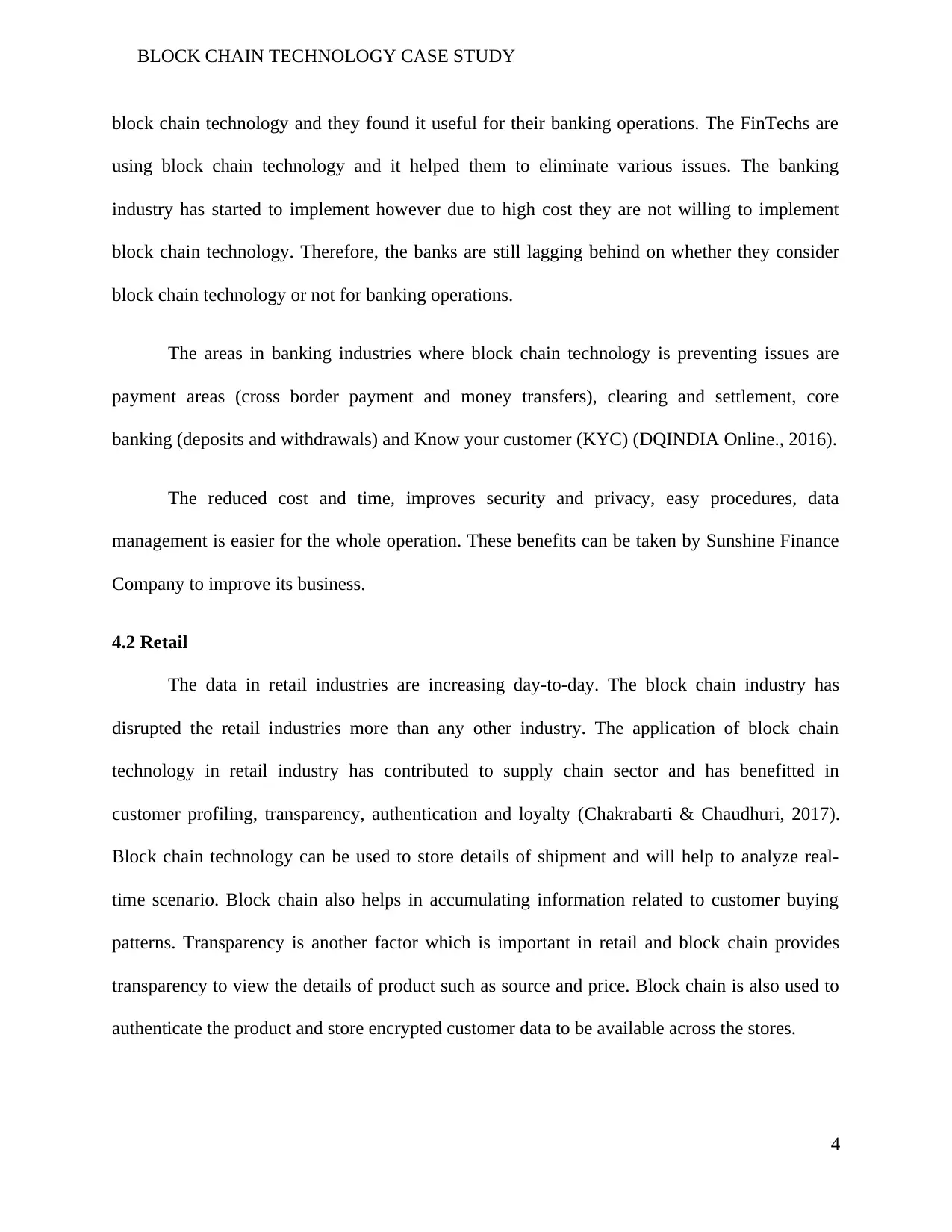
BLOCK CHAIN TECHNOLOGY CASE STUDY
block chain technology and they found it useful for their banking operations. The FinTechs are
using block chain technology and it helped them to eliminate various issues. The banking
industry has started to implement however due to high cost they are not willing to implement
block chain technology. Therefore, the banks are still lagging behind on whether they consider
block chain technology or not for banking operations.
The areas in banking industries where block chain technology is preventing issues are
payment areas (cross border payment and money transfers), clearing and settlement, core
banking (deposits and withdrawals) and Know your customer (KYC) (DQINDIA Online., 2016).
The reduced cost and time, improves security and privacy, easy procedures, data
management is easier for the whole operation. These benefits can be taken by Sunshine Finance
Company to improve its business.
4.2 Retail
The data in retail industries are increasing day-to-day. The block chain industry has
disrupted the retail industries more than any other industry. The application of block chain
technology in retail industry has contributed to supply chain sector and has benefitted in
customer profiling, transparency, authentication and loyalty (Chakrabarti & Chaudhuri, 2017).
Block chain technology can be used to store details of shipment and will help to analyze real-
time scenario. Block chain also helps in accumulating information related to customer buying
patterns. Transparency is another factor which is important in retail and block chain provides
transparency to view the details of product such as source and price. Block chain is also used to
authenticate the product and store encrypted customer data to be available across the stores.
4
block chain technology and they found it useful for their banking operations. The FinTechs are
using block chain technology and it helped them to eliminate various issues. The banking
industry has started to implement however due to high cost they are not willing to implement
block chain technology. Therefore, the banks are still lagging behind on whether they consider
block chain technology or not for banking operations.
The areas in banking industries where block chain technology is preventing issues are
payment areas (cross border payment and money transfers), clearing and settlement, core
banking (deposits and withdrawals) and Know your customer (KYC) (DQINDIA Online., 2016).
The reduced cost and time, improves security and privacy, easy procedures, data
management is easier for the whole operation. These benefits can be taken by Sunshine Finance
Company to improve its business.
4.2 Retail
The data in retail industries are increasing day-to-day. The block chain industry has
disrupted the retail industries more than any other industry. The application of block chain
technology in retail industry has contributed to supply chain sector and has benefitted in
customer profiling, transparency, authentication and loyalty (Chakrabarti & Chaudhuri, 2017).
Block chain technology can be used to store details of shipment and will help to analyze real-
time scenario. Block chain also helps in accumulating information related to customer buying
patterns. Transparency is another factor which is important in retail and block chain provides
transparency to view the details of product such as source and price. Block chain is also used to
authenticate the product and store encrypted customer data to be available across the stores.
4
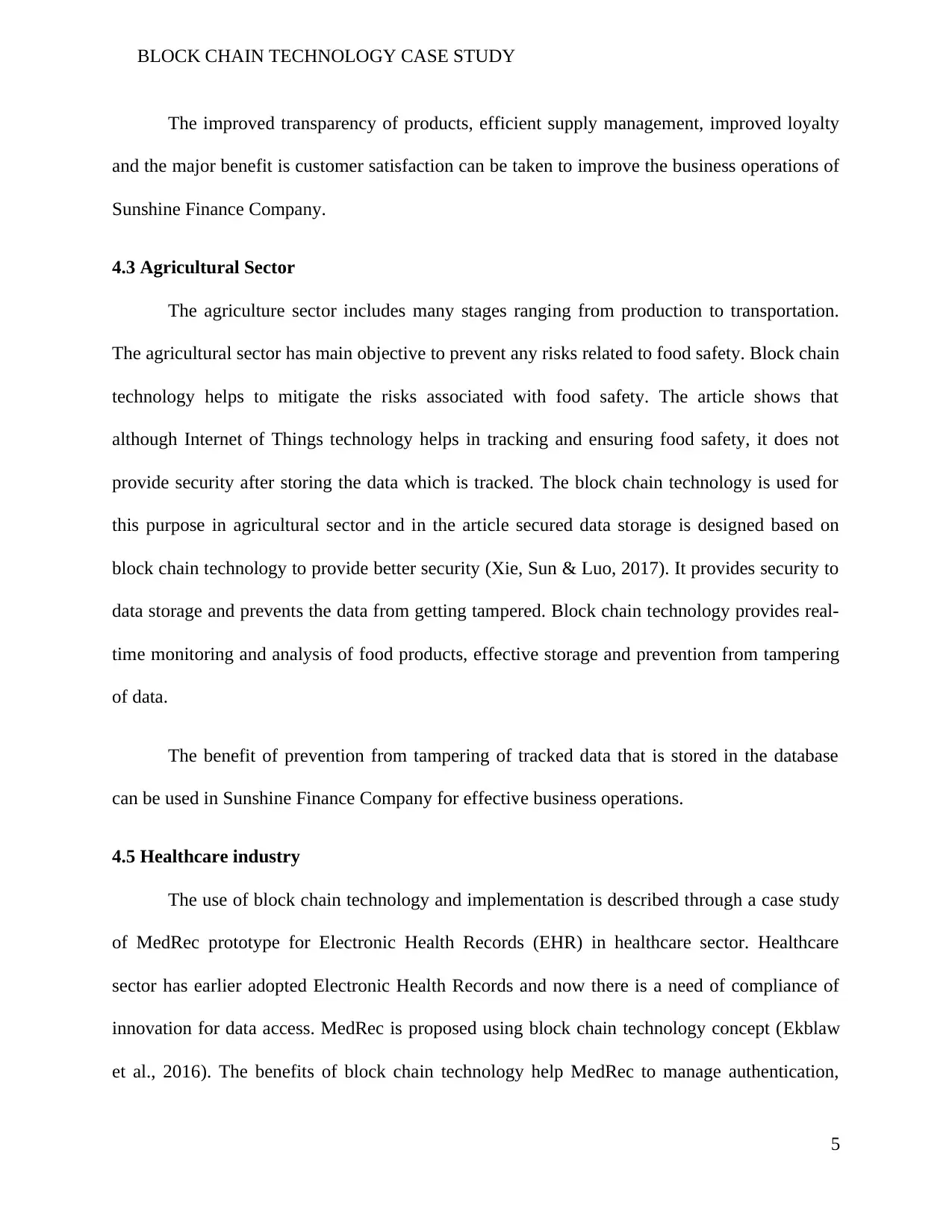
BLOCK CHAIN TECHNOLOGY CASE STUDY
The improved transparency of products, efficient supply management, improved loyalty
and the major benefit is customer satisfaction can be taken to improve the business operations of
Sunshine Finance Company.
4.3 Agricultural Sector
The agriculture sector includes many stages ranging from production to transportation.
The agricultural sector has main objective to prevent any risks related to food safety. Block chain
technology helps to mitigate the risks associated with food safety. The article shows that
although Internet of Things technology helps in tracking and ensuring food safety, it does not
provide security after storing the data which is tracked. The block chain technology is used for
this purpose in agricultural sector and in the article secured data storage is designed based on
block chain technology to provide better security (Xie, Sun & Luo, 2017). It provides security to
data storage and prevents the data from getting tampered. Block chain technology provides real-
time monitoring and analysis of food products, effective storage and prevention from tampering
of data.
The benefit of prevention from tampering of tracked data that is stored in the database
can be used in Sunshine Finance Company for effective business operations.
4.5 Healthcare industry
The use of block chain technology and implementation is described through a case study
of MedRec prototype for Electronic Health Records (EHR) in healthcare sector. Healthcare
sector has earlier adopted Electronic Health Records and now there is a need of compliance of
innovation for data access. MedRec is proposed using block chain technology concept (Ekblaw
et al., 2016). The benefits of block chain technology help MedRec to manage authentication,
5
The improved transparency of products, efficient supply management, improved loyalty
and the major benefit is customer satisfaction can be taken to improve the business operations of
Sunshine Finance Company.
4.3 Agricultural Sector
The agriculture sector includes many stages ranging from production to transportation.
The agricultural sector has main objective to prevent any risks related to food safety. Block chain
technology helps to mitigate the risks associated with food safety. The article shows that
although Internet of Things technology helps in tracking and ensuring food safety, it does not
provide security after storing the data which is tracked. The block chain technology is used for
this purpose in agricultural sector and in the article secured data storage is designed based on
block chain technology to provide better security (Xie, Sun & Luo, 2017). It provides security to
data storage and prevents the data from getting tampered. Block chain technology provides real-
time monitoring and analysis of food products, effective storage and prevention from tampering
of data.
The benefit of prevention from tampering of tracked data that is stored in the database
can be used in Sunshine Finance Company for effective business operations.
4.5 Healthcare industry
The use of block chain technology and implementation is described through a case study
of MedRec prototype for Electronic Health Records (EHR) in healthcare sector. Healthcare
sector has earlier adopted Electronic Health Records and now there is a need of compliance of
innovation for data access. MedRec is proposed using block chain technology concept (Ekblaw
et al., 2016). The benefits of block chain technology help MedRec to manage authentication,
5
⊘ This is a preview!⊘
Do you want full access?
Subscribe today to unlock all pages.

Trusted by 1+ million students worldwide
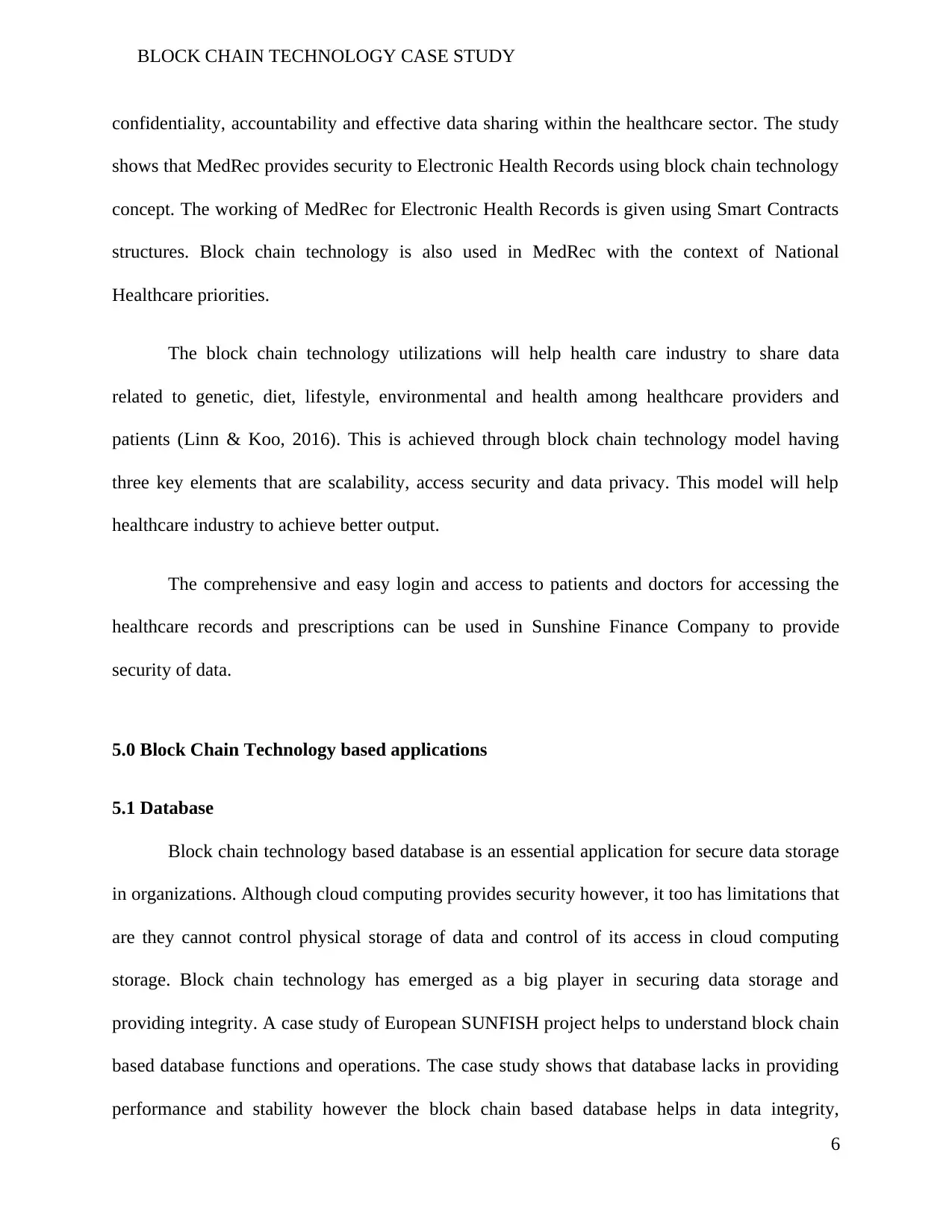
BLOCK CHAIN TECHNOLOGY CASE STUDY
confidentiality, accountability and effective data sharing within the healthcare sector. The study
shows that MedRec provides security to Electronic Health Records using block chain technology
concept. The working of MedRec for Electronic Health Records is given using Smart Contracts
structures. Block chain technology is also used in MedRec with the context of National
Healthcare priorities.
The block chain technology utilizations will help health care industry to share data
related to genetic, diet, lifestyle, environmental and health among healthcare providers and
patients (Linn & Koo, 2016). This is achieved through block chain technology model having
three key elements that are scalability, access security and data privacy. This model will help
healthcare industry to achieve better output.
The comprehensive and easy login and access to patients and doctors for accessing the
healthcare records and prescriptions can be used in Sunshine Finance Company to provide
security of data.
5.0 Block Chain Technology based applications
5.1 Database
Block chain technology based database is an essential application for secure data storage
in organizations. Although cloud computing provides security however, it too has limitations that
are they cannot control physical storage of data and control of its access in cloud computing
storage. Block chain technology has emerged as a big player in securing data storage and
providing integrity. A case study of European SUNFISH project helps to understand block chain
based database functions and operations. The case study shows that database lacks in providing
performance and stability however the block chain based database helps in data integrity,
6
confidentiality, accountability and effective data sharing within the healthcare sector. The study
shows that MedRec provides security to Electronic Health Records using block chain technology
concept. The working of MedRec for Electronic Health Records is given using Smart Contracts
structures. Block chain technology is also used in MedRec with the context of National
Healthcare priorities.
The block chain technology utilizations will help health care industry to share data
related to genetic, diet, lifestyle, environmental and health among healthcare providers and
patients (Linn & Koo, 2016). This is achieved through block chain technology model having
three key elements that are scalability, access security and data privacy. This model will help
healthcare industry to achieve better output.
The comprehensive and easy login and access to patients and doctors for accessing the
healthcare records and prescriptions can be used in Sunshine Finance Company to provide
security of data.
5.0 Block Chain Technology based applications
5.1 Database
Block chain technology based database is an essential application for secure data storage
in organizations. Although cloud computing provides security however, it too has limitations that
are they cannot control physical storage of data and control of its access in cloud computing
storage. Block chain technology has emerged as a big player in securing data storage and
providing integrity. A case study of European SUNFISH project helps to understand block chain
based database functions and operations. The case study shows that database lacks in providing
performance and stability however the block chain based database helps in data integrity,
6
Paraphrase This Document
Need a fresh take? Get an instant paraphrase of this document with our AI Paraphraser
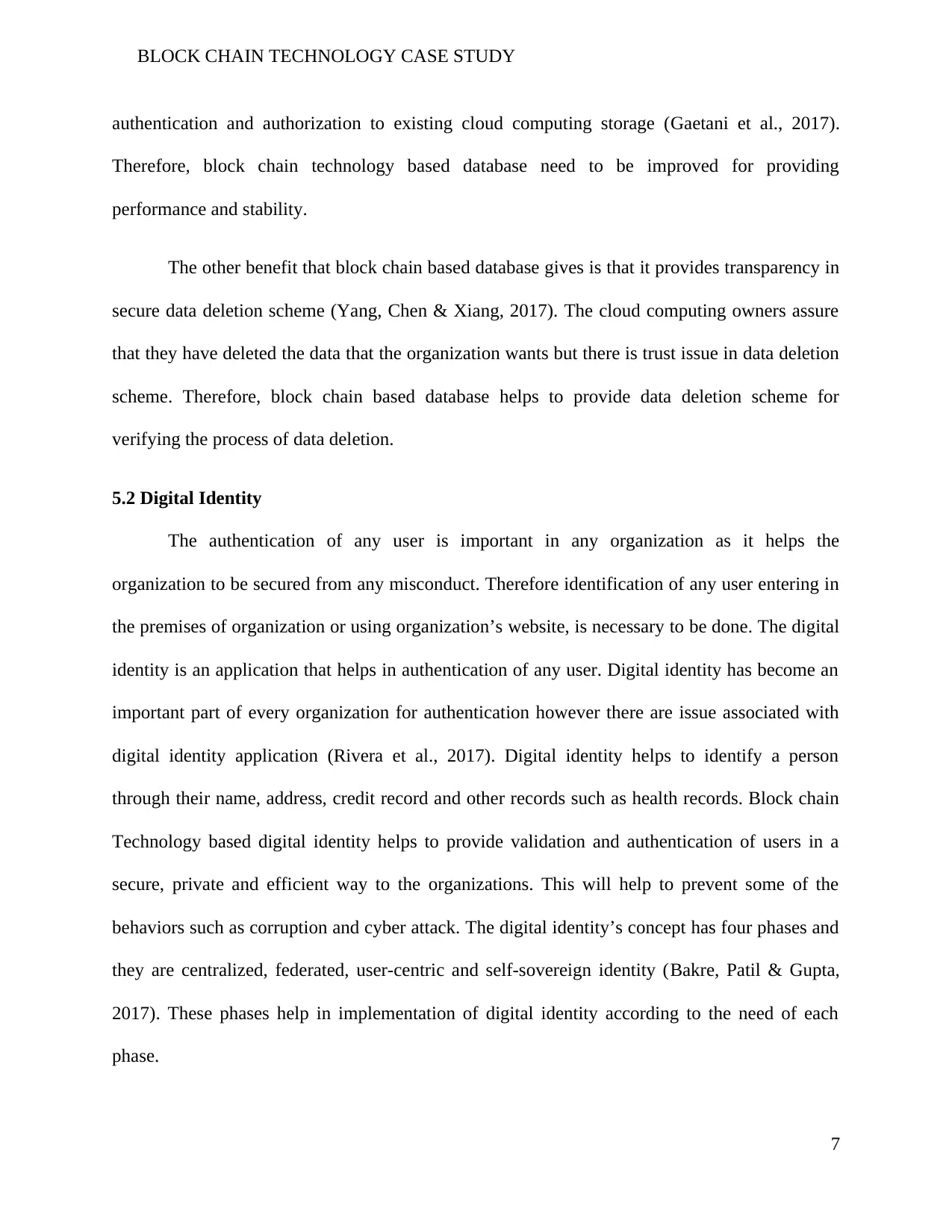
BLOCK CHAIN TECHNOLOGY CASE STUDY
authentication and authorization to existing cloud computing storage (Gaetani et al., 2017).
Therefore, block chain technology based database need to be improved for providing
performance and stability.
The other benefit that block chain based database gives is that it provides transparency in
secure data deletion scheme (Yang, Chen & Xiang, 2017). The cloud computing owners assure
that they have deleted the data that the organization wants but there is trust issue in data deletion
scheme. Therefore, block chain based database helps to provide data deletion scheme for
verifying the process of data deletion.
5.2 Digital Identity
The authentication of any user is important in any organization as it helps the
organization to be secured from any misconduct. Therefore identification of any user entering in
the premises of organization or using organization’s website, is necessary to be done. The digital
identity is an application that helps in authentication of any user. Digital identity has become an
important part of every organization for authentication however there are issue associated with
digital identity application (Rivera et al., 2017). Digital identity helps to identify a person
through their name, address, credit record and other records such as health records. Block chain
Technology based digital identity helps to provide validation and authentication of users in a
secure, private and efficient way to the organizations. This will help to prevent some of the
behaviors such as corruption and cyber attack. The digital identity’s concept has four phases and
they are centralized, federated, user-centric and self-sovereign identity (Bakre, Patil & Gupta,
2017). These phases help in implementation of digital identity according to the need of each
phase.
7
authentication and authorization to existing cloud computing storage (Gaetani et al., 2017).
Therefore, block chain technology based database need to be improved for providing
performance and stability.
The other benefit that block chain based database gives is that it provides transparency in
secure data deletion scheme (Yang, Chen & Xiang, 2017). The cloud computing owners assure
that they have deleted the data that the organization wants but there is trust issue in data deletion
scheme. Therefore, block chain based database helps to provide data deletion scheme for
verifying the process of data deletion.
5.2 Digital Identity
The authentication of any user is important in any organization as it helps the
organization to be secured from any misconduct. Therefore identification of any user entering in
the premises of organization or using organization’s website, is necessary to be done. The digital
identity is an application that helps in authentication of any user. Digital identity has become an
important part of every organization for authentication however there are issue associated with
digital identity application (Rivera et al., 2017). Digital identity helps to identify a person
through their name, address, credit record and other records such as health records. Block chain
Technology based digital identity helps to provide validation and authentication of users in a
secure, private and efficient way to the organizations. This will help to prevent some of the
behaviors such as corruption and cyber attack. The digital identity’s concept has four phases and
they are centralized, federated, user-centric and self-sovereign identity (Bakre, Patil & Gupta,
2017). These phases help in implementation of digital identity according to the need of each
phase.
7
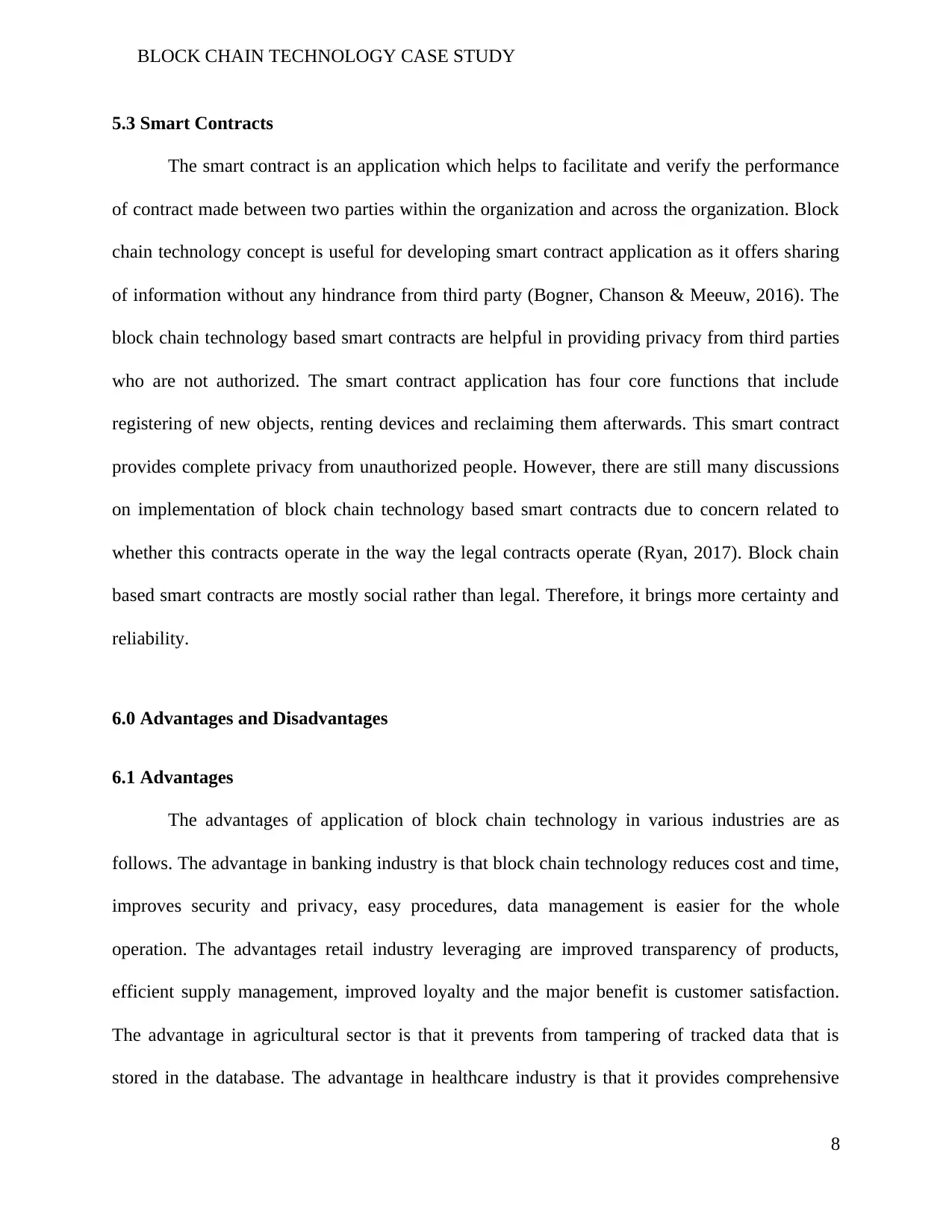
BLOCK CHAIN TECHNOLOGY CASE STUDY
5.3 Smart Contracts
The smart contract is an application which helps to facilitate and verify the performance
of contract made between two parties within the organization and across the organization. Block
chain technology concept is useful for developing smart contract application as it offers sharing
of information without any hindrance from third party (Bogner, Chanson & Meeuw, 2016). The
block chain technology based smart contracts are helpful in providing privacy from third parties
who are not authorized. The smart contract application has four core functions that include
registering of new objects, renting devices and reclaiming them afterwards. This smart contract
provides complete privacy from unauthorized people. However, there are still many discussions
on implementation of block chain technology based smart contracts due to concern related to
whether this contracts operate in the way the legal contracts operate (Ryan, 2017). Block chain
based smart contracts are mostly social rather than legal. Therefore, it brings more certainty and
reliability.
6.0 Advantages and Disadvantages
6.1 Advantages
The advantages of application of block chain technology in various industries are as
follows. The advantage in banking industry is that block chain technology reduces cost and time,
improves security and privacy, easy procedures, data management is easier for the whole
operation. The advantages retail industry leveraging are improved transparency of products,
efficient supply management, improved loyalty and the major benefit is customer satisfaction.
The advantage in agricultural sector is that it prevents from tampering of tracked data that is
stored in the database. The advantage in healthcare industry is that it provides comprehensive
8
5.3 Smart Contracts
The smart contract is an application which helps to facilitate and verify the performance
of contract made between two parties within the organization and across the organization. Block
chain technology concept is useful for developing smart contract application as it offers sharing
of information without any hindrance from third party (Bogner, Chanson & Meeuw, 2016). The
block chain technology based smart contracts are helpful in providing privacy from third parties
who are not authorized. The smart contract application has four core functions that include
registering of new objects, renting devices and reclaiming them afterwards. This smart contract
provides complete privacy from unauthorized people. However, there are still many discussions
on implementation of block chain technology based smart contracts due to concern related to
whether this contracts operate in the way the legal contracts operate (Ryan, 2017). Block chain
based smart contracts are mostly social rather than legal. Therefore, it brings more certainty and
reliability.
6.0 Advantages and Disadvantages
6.1 Advantages
The advantages of application of block chain technology in various industries are as
follows. The advantage in banking industry is that block chain technology reduces cost and time,
improves security and privacy, easy procedures, data management is easier for the whole
operation. The advantages retail industry leveraging are improved transparency of products,
efficient supply management, improved loyalty and the major benefit is customer satisfaction.
The advantage in agricultural sector is that it prevents from tampering of tracked data that is
stored in the database. The advantage in healthcare industry is that it provides comprehensive
8
⊘ This is a preview!⊘
Do you want full access?
Subscribe today to unlock all pages.

Trusted by 1+ million students worldwide
1 out of 18
Related Documents
Your All-in-One AI-Powered Toolkit for Academic Success.
+13062052269
info@desklib.com
Available 24*7 on WhatsApp / Email
![[object Object]](/_next/static/media/star-bottom.7253800d.svg)
Unlock your academic potential
Copyright © 2020–2026 A2Z Services. All Rights Reserved. Developed and managed by ZUCOL.




